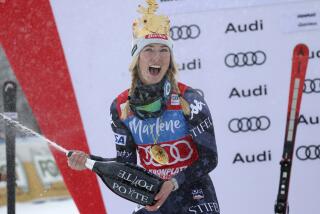THE OLYMPICS / WINTER GAMES AT ALBERTVILLE : Norwegian Is Double-Double Trouble for Tomba in Slalom : Skiing: After a strong first run, Jagge beats the Italian by 0.28 seconds. Austria’s Tritscher wins bronze.
- Share via
LES MENUIRES, France — Alberto Tomba got rid of his six-day beard between runs Saturday, but couldn’t shave enough time to win his fourth Olympic gold medal, losing by a little more than a whisker to Finn Christian Jagge in the men’s slalom.
Contrary to his first name, Jagge is Norwegian. He’s also the No. 2-ranked slalom skier in the world, so his victory was not a complete surprise.
More startling to the 20,000 spectators was Tomba’s first run, which was good enough for sixth place, 1.58 seconds behind Jagge, who was far ahead of everyone with his time of 51.43 seconds.
“My skis were no good the first time; they had too much edge,” said Tomba, who still thought he might have the field where he wanted it.
About 3 1/2 hours later, having refiled both his skis and his face, Tomba electrified his flag-waving fans with the fastest time of the second run, 51.66 seconds, which was enough to vault him into the lead with only the five racers who had finished the first run ahead of him still to come down.
One by one, Tomas Fogdoe of Sweden, Paul Accola and Patrick Staub of Switzerland and Michael Tritscher of Austria took aim at the Italian’s No. 1 slot on the scoreboard. As each streaked past the interval timer with slower clockings, the visitors from Turin, Milan and points south let out a thunderous roar.
Tomba remained in the gold-medal position, less than a minute away from an unprecedented Olympic double-double. He had repeated as giant slalom champion, the first Alpine skier in history to win the same event in successive Winter Games. That gave him three gold medals. Now, if Jagge would cooperate, Tomba could make it four by duplicating his slalom victory at Calgary in 1988.
The Norwegian, seeking to give his country its second Alpine gold medal, to go with Kjetil Andre Aamodt’s in the men’s super-G, burst out of the gate, knowing he started with that relatively huge margin from the first run. By the intermediate point, he had fallen 1.02 seconds behind Tomba for the second run--but still slightly ahead in total time. With everyone going bananas, Jagge accelerated enough to cross the finish line in 52.96 for a 1:44.39 total that thrust him into the gold medal, 0.28 seconds ahead of Tomba, who had to settle for silver.
As his ecstatic Norwegian teammates lifted the new champion onto their shoulders, another roar came up from those in the crowd who appreciated both Jagge’s refusal to wilt under pressure and Tomba’s effort as he tried to make up more than 1 1/2 seconds on a course less than a minute in length.
Of course, it didn’t hurt that the gates on the second course were set by Gustavo Thoeni, Tomba’s personal coach. But Tomba still had to ski through all of them, same as the other racers.
Among the leaders who failed to negotiate that second course were Norway’s Ole Christian Furuseth, Germany’s Armin Bittner and Italy’s Fabio DeCrignis. They joined two contenders who couldn’t make it entirely down the first course--four-time World Cup champion Marc Girardelli of Luxembourg and local favorite Patrice Bianchi of France. Each was within sight of the finish when he missed a gate and jumped the tracks.
Girardelli, who had won silver medals in the super-G and giant slalom, pounded the side of his head with his hand.
The bronze medal went to Tritscher, giving Austria eight medals in the Alpine events, including three golds. Italy was the runner-up with five medals--also including three golds--and Norway wound up third with four medals, two of them gold.
Jagge, 25, of Voyenenga, Norway, said: “This was a big victory for my country, especially since we will be the host of the next Winter Olympics in 1994.”
Tomba, who got over his disappointment in a matter of seconds, congratulated the winner and said: “I am happy for you, but now let’s see what happens the next time.”
That will be next month as the World Cup winds down, and then the long-range preparations for the ’94 Lillehammer Games will begin.
Marking himself as a slalom skier to watch between now and then was Matt Grosjean--the French pronounce his name “Grow-john”--of Steamboat Springs Colo. Only 21, he showed he could keep up with the big boys by placing 10th, 2.55 seconds behind the winner.
“It’s a good way to start in the Olympics,” said Grosjean, who appears to have recovered fully from his December knee injury. “It was a great race, and I’m happy I had such a fast second run. The injury didn’t help my training, but I’m fine now and making real progress.
“I’m going to take a couple of days off to visit my girlfriend in San Diego. Then it’s back to Europe for the final races.”


